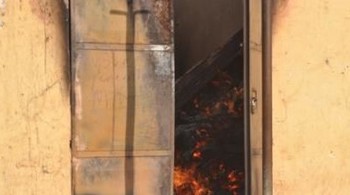People 'burnt to death' by government soldiers in Equatoria, says Amnesty

Rights group Amnesty International released a new report on Tuesday which detailed the ongoing conflict in South Sudan’s Equatoria region over the past year and the atrocities, starvation and fear local residents faced.
“Men, women and children have been shot, hacked to death with machetes and burnt alive in their homes. Women and girls have been gang-raped and abducted,” said Donatella Rovera, Amnesty International’s Senior Crisis Response Adviser.
The report said homes, schools, medical facilities and humanitarian organizations’ compounds have been looted, vandalized and burnt to the ground, adding that food is being used as a weapon of war.
The rights group further said that government forces, supported by allied militia, including the notoriously unaccountable Mathiang Anyoor, comprised of young, mainly ethnic Dinka fighters have committed a litany of violations with impunity. Opposition armed groups have also committed grave abuses, albeit on a smaller scale, according to Amnesty International.
Deliberate killings
Numerous eyewitnesses in villages around Yei, according to the report, narrated how government forces and allied militia deliberately killed civilians with reckless abandon.
“In one such attack on the evening of 16 May 2017, government soldiers arbitrarily detained 11 men in Kudupi village, in Kajo-Keji County, near the Uganda border. They forced eight of them into a hut, locked the door, set it ablaze and fired several shots into the burning structure. Six were killed in the incident – two burnt to death and the other four were shot as they tried to flee,” the report said.
Amnesty International pointed out that at least nine villagers disappeared after being taken by soldiers from a barracks near Gimunu, 13 kilometres outside Yei town, on 21 May 2017.
“A police investigation located the bodies of all nine by mid-June. The victims are believed to have been hacked to death with machetes. Nobody has been held to account, which is apparently not unusual when police try to investigate cases of soldiers killing civilians,” the report stated.
The rights group found that attacks on villages by government forces often appear to be in revenge for the activities of opposition forces in the region.
The report revealed that armed opposition fighters have also deliberately killed civilians they deem to be government supporters, often simply for being Dinka or refugees from Sudan’s Nuba Mountains region who are accused of sympathizing with the government.
Rape and sexual violence
Amnesty International also documented how abductions and rape of women and girls have skyrocketed across the Equatoria region since fighting escalated last year.
“The only way for women and girls to be safe is to be dead – there is no way to be safe so long as we are alive, this is how bad it is,” Mary, a 23-year-old mother of five told the organization.
The report said that women are particularly at risk of sexual assault when they venture out of town to look for food in the surrounding rural areas.
Food as a weapon of war
The organization said civilians’ access to food is severely limited. Both government and opposition forces have cut food supplies to certain areas, systematically looted food from markets and homes and targeted civilians carrying even the smallest amount of food across frontlines, according to the report.
In the town of Yei, the report said, the majority of whose inhabitants have fled in the past year, the remaining civilians are under virtual siege.
“It is a cruel tragedy of this war that South Sudan’s breadbasket – a region that a year ago could feed millions – has turned into treacherous killing fields that have forced close to a million to flee in search of safety,” said Joanne Mariner, Amnesty International’s Senior Crisis Response Adviser.
The rights group urged UN peacekeepers to live up to their mandate to protect civilians in South Sudan.
SPLA spokesman Santo Domic could not immediately be reached for comment.